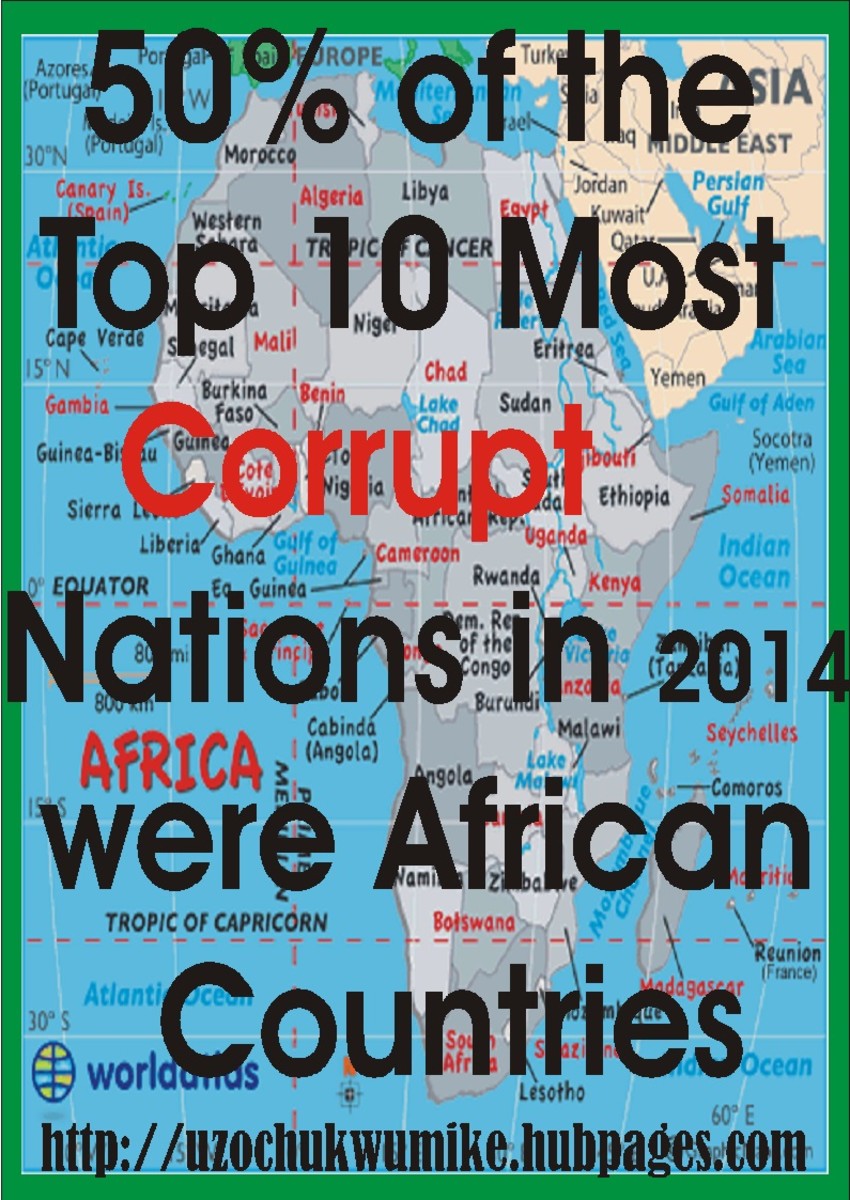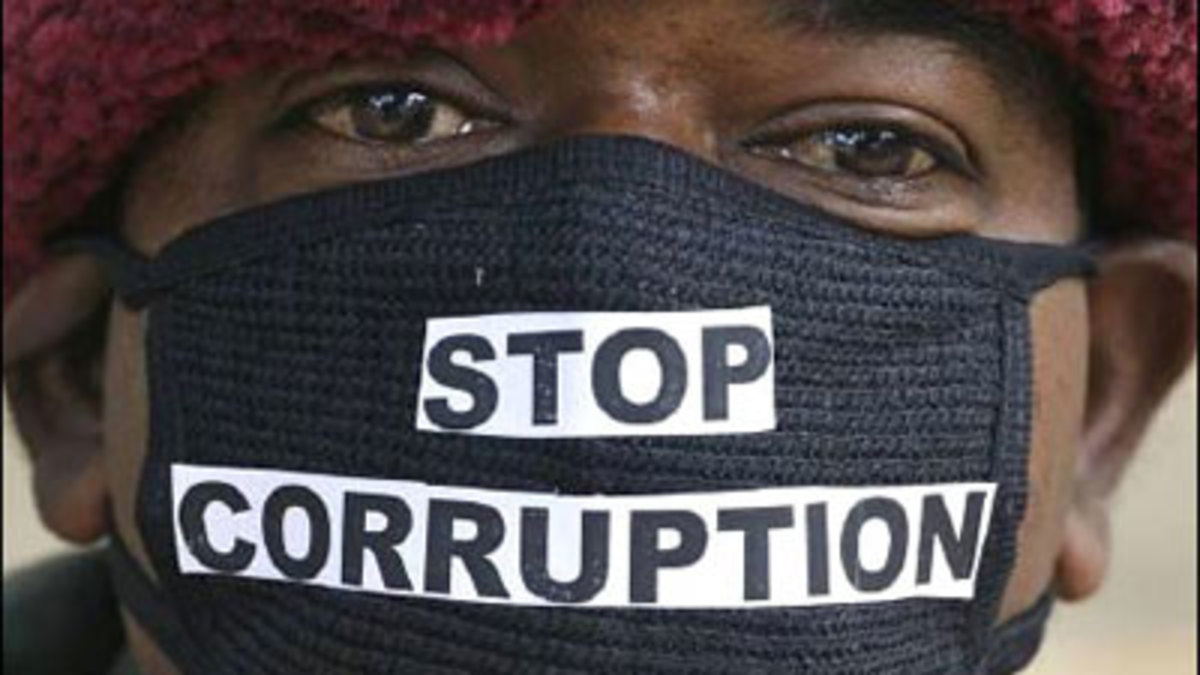Corruption is everywhere but the nature of the approach given to it depends on the level of its reduction – Uzochukwu Mike 2015

Africa is a continent made up of a mainly black race.The Continent has many virgin mineral resources which are not yet explored. African countries in totality have ranked high in the level of corruption by many corruption ranking organizations. Corruption in Africa has causes, effects, and also possible solutions. Corruption is like “solid dirt” on the cloth of mad man which bites and attacks his skin.
This bad act call corruption has made Africa be in the state of dwarfism. It has made her be in the state of stunted growth.
In many countries you can pay off police officers to ignore any crime, however horrific and devastating – it’s just a matter of price. Nearly 75 million people in Sub-Saharan Africa are estimated to have paid a bribe in the past year – some to escape punishment by the police or courts, but many forced to pay to get access to the basic services that they desperately need (Transparency International 2015).
Corruption is the illegitimate use of power to benefit a private interest (Morris 1991). Corruption is the giving of a bribe by a person to an official so that the truth will not be told. It involves the embezzlement of public fund for personal use (Uzochukwu 2014). Corruption parades itself in many public offices in Africa as the politicians in the countries mismanage and divert the public funds which are supposed to be used for continental development for their individual and private use. Money laundering from African countries to Europe by public officers is not a new update in the continent.
The Transparency International anti-corruption organizations ranking in terms of corruption level going on in some continents has Africa as one of the countries that have been swimming in the ocean of corruption. Documentation and facts have proved this survey as Africans themselves strongly believe that the governments ruling in the continent are much corrupt.
But, how does Transparency International and other corruption ranking organizations grade countries corruption Level? The Corruption Perceptions Index ranks countries and territories based on how corrupt their public sector is perceived to be. A country or territory’s score indicates the perceived level of public sector corruption on a scale of 0 – 100, where 0 means that a country is perceived as highly corrupt and 100 means it is perceived as very clean. A country’s rank indicates its position relative to the other countries and territories included in the index (Transparency International 2013). Before Transparency International publishes their report on corruption ranking of nations, they carried out a survey in the various countries to detect the level of corruption that ravages the societies.

In the 2014 corruption ranking by the organization, the ten most corrupt nations were Somalia, North Korea, Sudan, Afghanistan, South Sudan, Iraq, Turkmenistan, Uzbekistan, Eritrea, and Libya. This implies that Somalia was the most corrupt nation in 2014 followed by North Korea and the ranking continued in that sequence. In that year, the report showed that Africa still stood high in corruption. Out of the ten, Somalia, South Sudan, Sudan, Eritrea, and Libya, are African countries. Africa occupied 50% of the top ten most corrupt nations in that year.
Corruption is a complex issue with a vast array of determinants and effects that are often context and country specific (Claire 2010). The effects of corruption on Africa and other parts of the world are detrimental and weapon against national development.
In 2013, the result published by Transparency International showed that Africa still suffers from the deadly menace of corruption. The survey has the ten most corrupt territories in the world as Somalia, North Korea, Afghanistan, Sudan, South Sudan, Libya, Iraq, Turkmenistan, Syria, and Uzbekistan. Among all these countries, none of them scored above CPI (Corruption Perception Index) of 17%.
Examining the 2013 result critically, it shows that Africa ranks high in corruption level for that year. Somalia, Sudan, South Sudan, and Libya are all African countries that made the top ten most corrupt nations in 2013. Mathematically, the result shows that Africa occupied 40% of the top ten most corrupt countries in 2013. Somalia, for instance, has made great bad reputation because the government of the country constantly wine and dine with corruption. The backwardness in the country’s infrastructural and developmental achievement is because of corrupt in the country.
The 2012 ranking of corruption in the African continent is not all that different. Those who supposed to fight corruption in the countries are not able to carry out such function because they are also corrupt. How can governments who are swimming in bribery and corruption fight the menace effective? It is not possible because it is like a thief telling another thief to stop stealing.
Afghanistan, North Korea, Somalia, Sudan, Myanmar, Turkmenistan, Uzbekistan, Iraq, Burundi, and Chad were the top ten most corrupt territories in 2012. Somalia, Sudan, and Chad had CPI scores of 8, 13, and 19% respectively and they are all African countries. In the year 2012, Transparency International surveyed 176 countries but African countries have their names at the bottom of the table.
It had been a normal thing for the name of African countries to be seen at the bottom level of the list of the most corrupt nations in the world. Because of this tradition, the 2011 ranking of the most corrupt countries in the world did not overlook the continent as reaping greatly in the status of high corruption. The 2011 survey by Transparency International found 187 countries. North Korea, none African country, was ranked the most corrupt nation in that year. The corruption perception index listed the top ten most corrupt countries as North Korea, Somalia, Afghanistan, Myanmar, Uzbekistan, Turkmenistan, Sudan, Iraq, Haiti, and Burundi. Somalia and Sudan were the only African countries that were listed among the top ten most corrupt nations in the world for the year 2011. That year found Asian countries as the major benefactor of corruption.
In the year 2010, the black race also made it among the most corrupt. Transparency International (TI) 2010 Corruption Perception Index (CPI), released in October 2010, identified Africa as the most corrupt region in the world. Sub-Sahara Africa is also one of the most under-developed regions on earth (United Nations 2009). Corruption is one of the factors that cause African backwardness in development. Somalia, Burma, Afghanistan, Iraq, Uzbekistan, Turkmenistan, Sudan, Chad, Burundi, and Equatorial Guinea were the top ten most corrupt in the year 2010. Somalia, Sudan, Chad, and Equatorial Guinea all came from one continent called Africa.

Corruption in Africa has many causes. Under this sub-heading, to be discussed are the major causes of corruption in the African continent. It is important to have in mind that different authors have different points of view on the causes of corruption. But at the end, all these points have similarities. Hence, the causes of corruption in African Continent are but not limited to:
A government that does not govern those they rule properly can in one way or the other be the promoter of corruption in the high level. Due to the fact that some government lack leadership skills, there is every possible that the officials that work in the government will be engaging in corrupt practices. The importance of skill acquisition in leadership is what most African leaders lack and this has been fertilizing the growth of corruption in African countries.
Take for instance that a government does not know how to make good plans on solid anti-corruption group that will help in solving corruption challenge in the country, he will continue in promoting the practice of corruption in the country because he fails to do his job adequately. When he does not set-up monitoring teams to dig deep on the affairs that go on in the private and public establishments, then there will be propagation of corruption in such country.
When you have two classic cars of your own and plan to forcefully collect the motorcycle of your neighbor for no reason rather than to sell and make more money because you think you need more money than him, what is such action called? When a governor in the African continent is paid as the Law of the land stipulates and he went further to embezzle the money that is made for the state’s development for his personal need, what can we call the action he took?
It centers on greediness and it is the major problem that many governments of various states are suffering from. It is a principal cause of corruption in the African continent as a whole. The reason why many presidents that govern countries in Africa are busy laundering the public funds which are supposed to be used for national development into foreign banks is because they are greedy. Instead of solving the problem of unemployment challenge in their countries with the public fund, they find it benefiting to embezzle the fund and the masses continues to suffer because of their greedy attitudes.
Because of the greediness that runs in the bloodstreams of various African politicians, they used their political status in intimidating others whom they think they can win. A notable instance is that found in Ghana, West African country. In Ghana, politicians have used their political powers to intimidate other citizens and claim their properties. Many politicians in the country have claimed the lands of other people whose fathers are dead because they (the politicians) have barristers who can paint lie to appear as truth and win such cases in the law court. What a wicked and greedy treatment?
When those who are serving in public offices know that no government will query them on the accountability on how they run their yearly expenses and incomes, there is a possibility that they will indulge in corruption. They can be taking a bribe and mismanaging the office funds as they know that the government of the state does not have the good time to start asking them on their yearly accounts presented and criticized by the government.
Also, because the African government does not properly present how they run their yearly budget, there is every possibility that something went wrong at the back during their leadership and nobody cared to asked them a question on that. Because there is a lack of transparency in the government of African countries, things are seriously falling apart.
Many Africans are ready to give up their lives for money. Some prefer to get the money either by crook or by hook and die young. Some are ready to sacrifice any part of their body just for money. African youths are ready to kill and commit any crime because they are seriously hungry for money. Even if it is carrying drugs into an unknown country, they can do it just for them to get paid at the end of the silly exercise.
Among the major causes of Corruption in Africa is the high quest for wealth. The government that rules African countries are not the only people who are corrupt but also the people they rule. Yes, when we talk about corruption, many people’s minds go to the corruption in the government but that should not be so.
There are many African youths who are into drug trafficking today just because they are seriously in need of money and not being satisfied with the one they already have with them. Many African youths are locked up in foreign countries all because they are excessively searching for money which got them into trafficking in drugs. A notable example is that with the Nigerian youths. On January 24, 2015, a discussion was brought up by Blaze FM, a local radio station located in Anambra State, Nigeria. The discussion was on two young Nigerians who were caught by the government of Indonesia and were sentenced to death for their act by the government of Indonesia. The Nigerian government appealed to the government of Indonesia not to take such actions. On the radio station, the audience were calling during the radio program on Blaze FM commenting on whether the government of Indonesia should nullify their decision and accept the appeal made by the government of Nigeria or not. The high quest for wealth is a driver to corruption in the African continent. It is also one of the major causes of corruption in Nigeria.
It is because of the high quest for wealth that made many Africans who were voted into a leadership position to do their best in drying up the purse of the government before stepping down from their leadership positions. This is not just one of the causes of corruption in Africa but one of the major challenges in the continent.
Unemployment has hit African continent had for the past years. The unemployed are ready to take any action that will fetch them money irrespective of whether it involves corrupt practices or not. In offices, people are ready to give bribes to the staff working under the employer just for them to secure jobs at the end of interviews. When these job seekers offer bribes that are how they will continue to collect from others who will be coming for employment into their companies for the coming years. Because of this, it becomes a tradition in the office and gives birth to other forms of corrupt practices.
Is selling fake products in the marketplaces a corrupt practice? The true definition of corruption has it as the action of corrupting or the state of being corrupt. The word “corrupt” implies willing to act dishonestly in return for money for personal gain. Because of unemployment that many citizens of the African continent are facing, many have indulged in the selling of fake products to the masses to maximize profits and create jobs for their relations. Hence, selling of fake products in markets is considered one of the arms of corruption.
The consequences of corruption on the African continent are so many that splitting them to the core can make up one thousand pages textbook. Hence, the effects of corruption on African countries are:
Is there any country in African continent that is marked as developed? Maybe that will be an assignment to you as the reader of this piece. As for the author of this piece, he has not heard or seen any African country that is referred officially as among the developed countries of the world.
Corruption has hindered Africa from being developed like most countries in the European continent. The countries in the continent either answer under-developed or developing. This has greatly affected the continent both nationally and internationally. How can the continent develop when the leaders are busy embezzling the countries funds to Europe who uses them in developing their own countries?
According to Oxford Advanced Learner’s Dictionary, “poverty” is defined as the state of being extremely poor. The poor state of Africans is because of corruption, which parades itself in almost all areas of the continents sector. This is a big disadvantage to most Africans as they measure below others from booming continents. In the year 2013, which country is referred to as the world’s poorest nation? The country which was the poorest in the world in 2013 is the Democratic Republic of Congo and this is an African country.
Because the government and African citizens are seriously engaging in corrupt practices, the people who are supposed to be made rich grow in poverty day by day. What is expected from a rich local driver when the corrupt government is demanding more than half of the money he makes from his basis on daily basis? Because of the high charge, the driver with time may quit his driving business because he does not have enough money to manage his car/bus as the corrupt government is sucking him for their selfish interest and hence goes poorly.
Unemployment is the state of being unemployed. Because the government of various African countries is corrupt, they do not create enough jobs for the citizens. The money which the government is to be used to create jobs for the masses is used in creating employment for the citizens of other countries by having money of Africans frozen in foreign banks through political money embezzlement.
Unemployment has been troubling Africa for years and the corruption in the continent keeps adding to the level of this troublesome challenge. In some countries in Africa, officials that work in offices collect monthly salaries of two workers while he is only one person. They forge fake names and forward to the payment body while the body does not know that the two names stand for only one person. When such corrupt practice keeps increasing, there becomes a rise in unemployment level in the countries.
The word “economic” is related to the economy. The economy is defined as the state of a country or area in terms of the production and consumption of goods and services and the supply of money. A country which is poor usually has low economic activities that go on in it. Economic recession is observed in Africa because the money which is to be used in promoting the economy of the continent is shifted by our leaders to other countries which add to their own economy.
Because of corruption in Africa, foreign investors who suppose to promote the economic standard are nowhere to be found because they are afraid of what might be the state of their businesses in future. Due to this fear, they do not want to play the risk of putting their businesses in danger in the future time.
How many African countries are free from crises? There are lots of crises in many African countries today and these are traceable to the level of corruption in those countries. We hear of crises in Nigeria, Somalia, Angola, Democratic Republic of Congo, Libya, and others. All these are as a result of corruption in either the political system or the religious practice going on in the country.
Libya, for instance, experienced series of crises or wars under the leader of Muammar Gaddafi who refused to step down as the president of the country. Quoting the statement from Transparency International of how the corrupt leadership of Gaddafi has caused a crisis in the country “The oil-rich country is on the verge of becoming a failed state with a powerless central government. This is the haunting legacy of Muammar Gaddafi’s corrupt regime that has left the country in a state of constant violence with weak institutions”. Colonel Gaddafi of Libya ruled the country for 42 years (from 1st September 1969 to 23rd August 2011), yet refused to step down which resulted in war.
In Nigeria, there is killing and bloodshed by Islamic group known as Boko Haram and they have shed blood that claimed the lives of thousands of the citizens of the country. Many Nigerians in the northern part of the country have immigrated to the nearby countries because of the “heat” from this group of heartless beings. The operation of Boko Haram in Nigeria is due to the corrupt political parties located in the country.
Development and standard are maintained when the responsible individuals who suppose to help in making them real and active perform their functions properly. When those who suppose to perform certain tasks on a particular project are messing up due to their high selfish interest and corruption, the project will not in any way be achieved. This is not far from what is going on in the education sector of Africa.
The education sector of Africa is a very big problem because those who suppose to manage the sector are corrupt. What is expected in African education sector when the heads of the universities are using the money allocated to them for the development of the institutions use them for their personal affairs and enrichment?
The same applies on the side of corrupt government in Africa who squandered the fund they suppose to use to bring up the standard of the continental education for their private use. The cost of corruption in Africa is high and this has affected the education sector of the continent in a very big way.

What are the solutions to African corruption? Do you really believe there is any antidote for corruption in Africa? The solutions to African corrupt state are:
The moment the politicians in African Continent understand properly that they came into this world with nothing and with nothing they will go back, there will be a reduction in the level of corruption in the continent. That is the truth as they are misbehaving and embezzling the public fund because they lack this knowledge.
Both the politicians and African citizens should be satisfied with what they have. If you are ruling as the president or governor, be satisfied with your monthly salary and do not take part in corrupt practices. If you are a civil servant or farmer, feel happy with your earning and do not go into drug trafficking or other corrupt business because you want to be richer than the world’s richest man.
The reason why corruption is still gaining more ground in Africa is because there is no adequate transparency and accountability observed in various offices in the continent. Calling up heads of every public and private establishment to give detail accounts of their spending each year will go a long way in solving corruption challenge in the continent. When the management does not give a good account of the companies spending and have him punished maybe through imprisonment, others will learn and make amend.
Setting-up anti-corruption groups in various states in Africa is a welcomed idea in tackling the challenge posed by unemployment in the continent. Before the establishment of this group, the leader and his co-workers should be those who are not going to be moved by material things. Also, the group should be independent of government so that any caught in corrupt practice will receive the adequate punishment he deserves.
Unemployment has made many persons went mad. Creating jobs for citizens of Africa will go a long way to minimizing Africans involvement in dirty businesses like drug and human trafficking. Also, individuals should work with the government to ensure that employment is secured for the citizens of Africa.
Conclusion
Corruption is a general problem but Africa suffers it most. There is high corruption in Africa and this has affected the continent in negative ways. Discussed were the corruption in Africa, overview, causes, effects and solutions. It is believed that the level of corruption in Africa will reduce if the prescribed ideas are put into practice.
References
